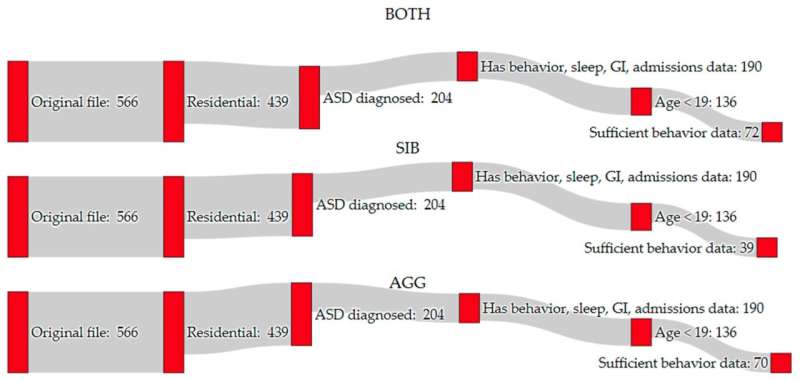This article has been reviewed according to Science X's editorial process and policies. Editors have highlighted the following attributes while ensuring the content's credibility:
fact-checked
trusted source
proofread
Researchers use AI to predict challenging behaviors common in profound autism

Using artificial intelligence tools to analyze years of biomedical data, researchers at Rensselaer Polytechnic Institute have discovered a possible connection between sleep, gastrointestinal health, and two potentially harmful behaviors often associated with profound autism: self-injury and aggression. Their study is published in the Journal of Personalized Medicine.
People with profound autism often need around-the-clock care. Additionally, it is not uncommon for them to exhibit self-injurious and aggressive behaviors, which present safety concerns for themselves and their caretakers.
"Avoiding or mitigating challenging behaviors has the potential to improve the lives of people with autism. This work has the potential to one day help caretakers predict when these challenging behaviors are more likely, helping them better plan activities and ensure everyone's well-being," said Juergen Hahn, Ph.D., senior author of the new study and head of Rensselaer's biomedical engineering department.
The study not only connects sleep and gastrointestinal issues with future challenging behaviors, it also shows that these health issues experienced can help predict the next day's behavior. The researchers found that, for one in five adolescents in the 80-person study group, gastrointestinal issues such as diarrhea and constipation predicted next-day challenging behaviors with more than 80% accuracy. Poor sleep quality—difficulty falling asleep or waking up multiple times during the night—also influenced behavior.
"We were not surprised to see that GI and sleep problems had an effect, as these are common health problems in those with autism spectrum disorder. However, finding such a strong connection between these issues and challenging behaviors is clinically significant and worth investigating further," said Hahn, who is also a member of Rensselaer's Shirley Ann Jackson, Ph.D. Center for Biotechnology and Interdisciplinary Studies.
The large quantity of data used in the study was collected by clinicians at The Center for Discovery, a research, educational, and residential Center of Excellence in Harris, New York, serving children and adults with medical and developmental disabilities such as autism spectrum disorders.
"I'm very excited about the results of this study," said Theresa Hamlin, Ed.D., president of The Center for Discovery and one of the study's co-authors. "At The Center, we have a very large corpus of data that spans more than a decade, but it's a complex data set with biological, behavioral, and environmental data."
"This study demonstrates that using AI and machine learning, we turn that data into usable information to better predict when an individual may exhibit a significant behavior. If we can predict a behavior, then we can work on mitigating or preventing the impact of that behavior on the individual and on others. That's huge."
While profound autism is a lifelong condition, health care providers and caregivers can address sleep and gastrointestinal health, which, the study suggests, could in turn help with challenging behaviors, Hahn explained.
"Dr. Hahn is well-known for his work at the intersection of autism spectrum disorder and biomedical data analysis, and this latest study exemplifies how artificial intelligence approaches can translate into promising health care treatments and practices," said Shekhar Garde, Ph.D., dean of Rensselaer's School of Engineering.
Several aspects of the study make the findings especially relevant to residential care settings, Hahn said. Rather than tracking sleep and gastrointestinal activity in the inevitably artificial environment of a clinical trial, the scientists analyzed data collected as residents at The Center for Discovery went about their daily lives. Furthermore, the study incorporated 18 months of data on each participant, a period far longer than most clinical studies.
"While there is still much work to be done, Dr. Hahn and the team at The Center are committed to collaborating to assist more individuals with complex disabilities in achieving greater joy and wellness in their lives," Hamlin said.
More information: Jennifer Ferina et al, Predicting Problematic Behavior in Autism Spectrum Disorder Using Medical History and Environmental Data, Journal of Personalized Medicine (2023). DOI: 10.3390/jpm13101513





















